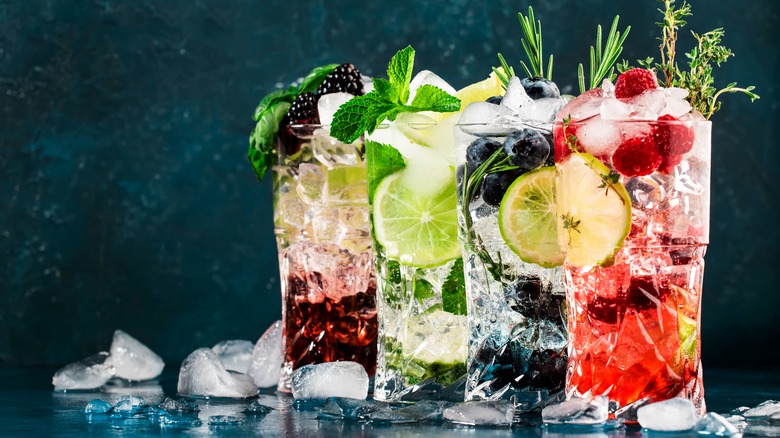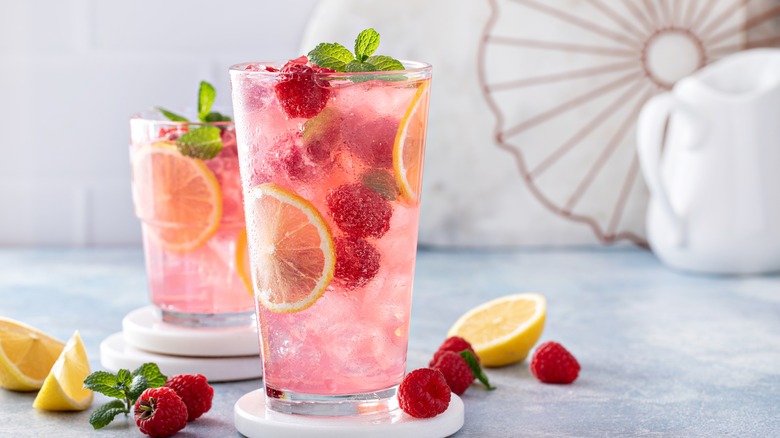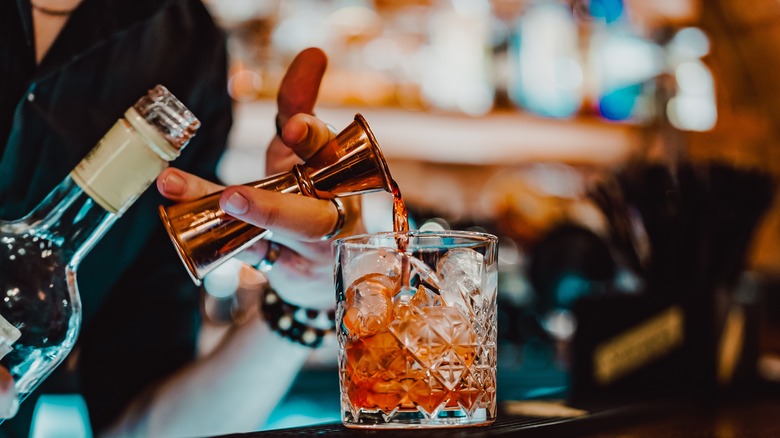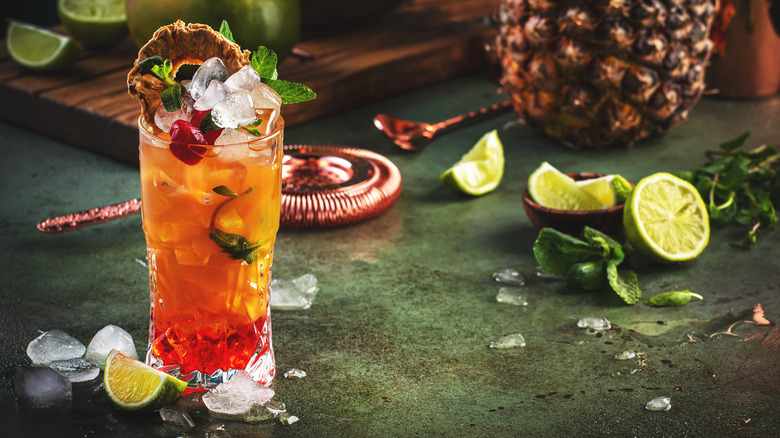We Need To Stop Calling Alcohol-Free Beverages 'Mocktails'
"And what can I get you to drink?" It's the question that has haunted my restaurant experiences since I made the decision to go sober several years ago. More often than not, the people I'm dining with will go for a beer or a glass of wine, and I'm left flipping through the menu, trying to find the "alcohol-free" section — which is usually adjacent to the kid's menu. Seeing that there are no options other than soda or chocolate milk, I'm left looking back up at the waitstaff and replying, "Water will be fine, thanks."
In the rare case that there are adult non-alcoholic beverages, they're often coded under the broad term "mocktail." There isn't a standard definition for what actually constitutes a mocktail, but it typically means a beverage that has the same properties as an alcoholic cocktail, just with the alcohol removed. But, as evidenced by the sorry excuses for mocktails — like orange juice stirred with a splash of seltzer — it's clear that calling these beverages a "mocktail" is nothing short of an insult, which is in turn projected onto the sober diners that drink them.
Mocktail implies the drink will taste like alcohol, which isn't always the case
The word mocktail encompasses a broad range of definitions, but it shouldn't. As a category, it can include drinks that are just grown-up lemonade — made with a quick pour of grenadine or muddled basil leaves — but also a combination of different sodas and fruit. These are the fruity, alcohol-free beverages that many people think of when they see "mocktail" listed on a menu. It doesn't take a trained mixologist to see that these drinks will never come close to resembling alcohol or cocktails in taste or composition — so the word "mock" is a bit disingenuous here.
Alternatively, mocktail can also encompass a class of drinks made with alcohol-free spirits, including tequila, rum, gin, and whiskey. These spirits are made with a similar process to the alcoholic versions, but they often prevent the formation of alcohol during distillation or remove it post-distillation. Using the word "mock" to describe these products is a bit more fair because they have a closer assemblage to traditional drinks.
It's important to note in this conversation that the word "mock" generally has a negative connotation. In reality, these spirits have the taste of alcohol, far fewer calories, and virtually no chance of a hangover after you drink them. Why would anyone ever mock that?
Alcohol-free beverages require just as much (if not more) effort as a traditional cocktail
My second objection to folks using the term mocktail to describe regular alcohol-free beverages is that it relegates the process of making authentic non-alcoholic cocktails to the simplistic process. You throw a cup of this in with a cup of that, toss in some cherries, and ta-da! The word mocktail instead undermines the craft that goes into making these beverages. The truth is that many mixologists have been trained to make intricate alcohol-free drinks, using botanicals for flavorful non-alcoholic spirits and selecting complementary flavors to develop cohesive, tasty beverages sans alcohol.
Arguably, making an ABV-free cocktail requires more effort. The pungent bite of liquor isn't there to hide anything, so matching flavors becomes even more important — it's the sole focus, actually. And while there are a lot of restaurants that realistically aren't doing much more than pouring a Shirley Temple, relegating all mocktails to this rudimentary framing limits the potential for ABV-free beverages to capture complex and mature flavor profiles.
Whatever you call it, we need more of them
Ideally, I would prefer a world where mocktails and non-alcoholic beverages are considered two separate things. But if forbidding people to use "mocktail" to describe a non-alcoholic beverage actually discourages restaurants from listing them on menus, then it's not a cause I support. Whether you call them mocktails (as demeaning as it is) or alcohol-free beverages, it's clear that we need more of them on menus everywhere — from sports bars to fine dining establishments. Imagine how much more inclusive it would be if restaurants offered diners more diverse beverage options for meals rather than only a wine pairing or beer flight.
Eating and drinking at a restaurant or at a party is all about enjoying the company of one another; excellent drinks and meals are integral parts of the festivities. Creating a welcoming environment where people can feel free to order what they want, regardless of the reason, is not only important for restaurants but also for the patrons who frequent them — with no mocking involved.



